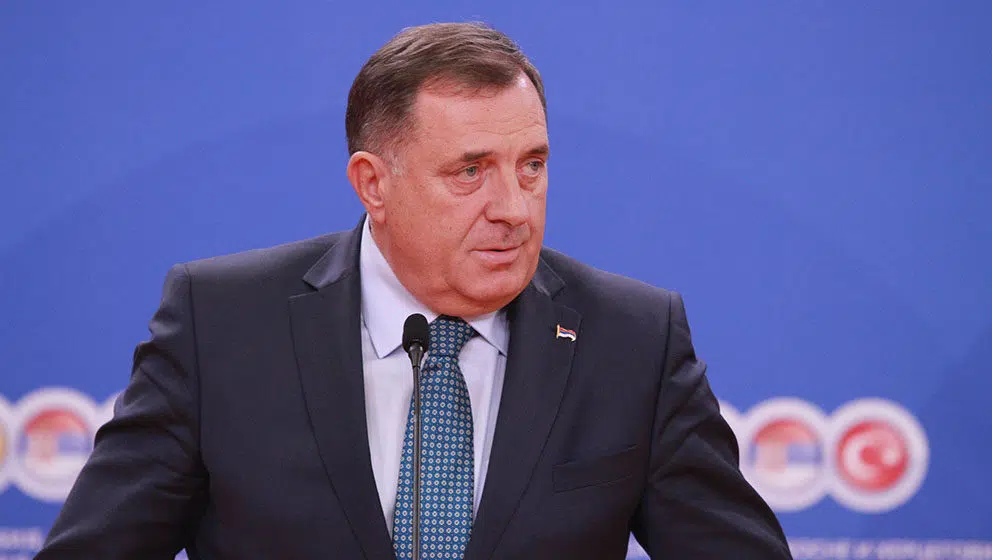All peoples have the right to determine their political status, completely free and without foreign interference, and to pursue their economic, social, and cultural development, and every state is obliged to respect this right in accordance with the provisions of the UN Charter, emphasized the President of the Republika Srpska, Milorad Dodik.
We bring you the column of the President of the Republic, Milorad Dodik, in full:
The Dayton Agreement or the General Framework Agreement for Peace in Bosnia and Herzegovina, as it is officially named, is one of the most important documents of international law created after World War II.
In addition to this general and framework agreement, it contains 11 annexes by which the signatories – Republika Srpska and the Federation of Bosnia and Herzegovina, have specifically and in detail worked out the conditions for achieving a peaceful solution after the civil war in Bosnia and Herzegovina.
As such, the Dayton Agreement is an international treaty to which the Vienna Convention on the Law of Treaties applies, as determined by the Venice Commission of the Council of Europe and the Constitutional Court of Bosnia and Herzegovina.
Certainly, the most important is Annex 4, entitled “Constitution of Bosnia and Herzegovina,” which established the constitutional structure of the state community formed by Republika Srpska and the Federation of Bosnia and Herzegovina (FBiH) creating post-war “Bosnia and Herzegovina,” without any designations of its state determination and arrangement.
Thus, Dayton’s Bosnia and Herzegovina is neither a republic, nor a federation (which it cannot be, as it already includes a federation), nor a federal state, nor anything else existing in constitutional law practice. It is closest to a confederation, considering the very small number of precisely listed state competencies that the two entities have transferred to the level of “Bosnia and Herzegovina.”
By doing so, they have the status of state-forming entities but have retained a vast majority of state competencies, all those not explicitly designated as competencies of “Bosnia and Herzegovina” by the Constitution.
This constitutional construction according to Article 3.3.a) of the Constitution of Bosnia and Herzegovina is very similar to the construction of the union of state members of the United States, as stated in Amendment 10 of the US Constitution:
“The powers not delegated to the United States by the Constitution, nor prohibited by it to the States, are reserved to the States respectively, or to the people.”
INTERNATIONAL LAW AS THE BASIS OF BOSNIA AND HERZEGOVINA
The formation and construction of post-war “Bosnia and Herzegovina” are based on international law. It was created at the international peace conference in Dayton in 1995, on November 21, when the peace agreement was initialed, to be officially signed in Paris on December 14 of the same year.
The basis was, as stated in Annex 4 – Constitution of Bosnia and Herzegovina: “Guided by the purposes and principles of the Charter of the United Nations, Committed to the sovereignty, territorial integrity, and political independence of Bosnia and Herzegovina in accordance with international law, Determined to ensure the full respect of international humanitarian law, Inspired by the Universal Declaration of Human Rights, the International Covenants on Civil and Political Rights, and on Economic, Social and Cultural Rights, as well as the Declaration on the Rights of Persons Belonging to National or Ethnic, Religious, and Linguistic Minorities, and other instruments for the protection of human rights.”
Considering that the Charter of the United Nations is the most important act of international law, it should start from its official, authentic interpretation, which was determined by the United Nations General Assembly at its 25th session held on October 24, 1970, adopting Resolution No. 2625, which brings the “Declaration on Principles of International Law concerning Friendly Relations and Cooperation among States in accordance with the Charter of the United Nations.”
This declaration is accepted by international judicial bodies as an authentic interpretation of the UN Charter. The Charter of the UN normates the principles of international law that obligate all UN members on a contractual basis and are considered rules of general international law. Considering that the Charter of the UN and the two international covenants on civil and political Economic, Social, and Cultural Rights, are an integral part of the Dayton Agreement and its Constitution of Bosnia and Herzegovina, the Declaration is also their authentic interpretation.
Therefore, according to the Declaration, the general principles of international law undoubtedly include: the principle of the prohibition of force; the principle of peaceful settlement of international disputes; the principle of non-intervention; the duty of states to cooperate with each other in accordance with the Charter of the UN; the principle of equality and self-determination of peoples; the principle of sovereign equality of states, and the principle
of fulfilling accepted international obligations in good faith.
Let’s cite the most important parts of this Declaration:
The introduction of the Declaration, among other things, states: “convinced that the subjection of peoples to foreign subjugation, domination, and exploitation constitutes a basic obstacle to the promotion of international peace and security, convinced that the principle of equal rights and self-determination of peoples is of significant contribution to contemporary international law and that its effective application is of the utmost importance for the promotion of friendly relations among states based on respect for the principle of sovereign equality,” elaborates through seven principles the relations among states and peoples.
Principle No. 1 of the Declaration obliges “the state to refrain in its international relations from the threat or use of force, whether against the territorial integrity or political independence of any state, or in any other manner inconsistent with the purposes of the United Nations.” Principle No. 3 confirms “the duty, in accordance with the Charter of the United Nations, not to intervene in matters within the domestic jurisdiction of any state.” Principle No. 5 – equality and self-determination of peoples; Principle No. 6 – sovereign equality of states.
The Charter of the United Nations does not differentiate between small and large peoples, nor does it differentiate between small and large states. Equality and equal rights and respect for the sovereignty of each state are general principles of international law.
When it comes to the principle of non-intervention in matters that are within the domestic jurisdiction of the state, the Declaration obliges: “No state (the USA, the United Kingdom, Germany…) or group of states (the PIC and its Steering Board as a self-appointed and self-selected body of self-selected countries without a basis in the Dayton Agreement) has the right to intervene, directly or indirectly (certain Western ambassadors in Sarajevo, the high representative and OHR, foreign judges in the Constitutional Court of Bosnia and Herzegovina, the Prosecutor’s Office and the Court of Bosnia and Herzegovina as unconstitutional judiciary, according to the Muslim occupier’s rule – the judge accuses you, the judge judges you), for any reason (due to the legitimate demands of the Republika Srpska for consistent adherence to the Dayton Agreement as it was signed; due to non-compliance with the illegal and illegitimate Christian Schmidt and his terrorist decisions; due to calls for the independence of Republika Srpska due to the violation of the Dayton Agreement by foreign states and their representatives, both ordinary – Murphys and special – Escobars, O’Briens, Pitchs, Sarazins; due to the constant outvoting of Serb judges in the Constitutional Court of Bosnia and Herzegovina; due to selective justice in the trials for war crimes and the acquittal of Muslim commanders – Naser Orić and others; due to the persecution of almost all members of the Army of Republika Srpska, accusations of “genocide,” etc.) in the internal or external affairs of any other state (the relationship of Republika Srpska as an internationally recognized entity towards other states – Serbia, Russia, Hungary, China, and others).
Therefore, not only armed intervention but also any other form of interference or any other threat directed against the person (sanctions to Dodik, Cvijanović, Stevandić, Višković, and others; rigged court processes based on imposed laws by Petritsch, Ashdown, Inzko, especially Christian Schmidt) of the state or against its political, economic, and cultural elements (shutdown of websites of the organs of Republika Srpska, stopping projects and funds based on already fulfilled reforms and goals of the European Union), are contrary to international law.
No state may apply or support the use of measures of economic, political, or any other nature to compel another state (Republika Srpska and its democratically elected government bodies) to submit to its sovereignty in the exercise of its sovereign rights (competencies that belong to Srpska according to the Constitution of Bosnia and Herzegovina and the Constitution of Republika Srpska, which is in accordance with the Constitution of Bosnia and Herzegovina) or to obtain any benefits from it (exploitation of agricultural, forest, water, mineral, and other resources that would follow the seizure of property through Schmidt’s “law” and decisions of unconstitutional institutions at the level of Bosnia and Herzegovina – the Commission for Concessions of Bosnia and Herzegovina).
The use of force (the threat of persecution – lawsuits and imprisonment) aimed at depriving peoples of their national identity (prohibition of January 9 as the Day of the Republic, the anthem “Bože pravde” and the coat of arms of Republika Srpska), constitutes a violation of their inalienable rights and the principle of non-intervention.
Therefore, to repeat, without inserts: “No state has the right to intervene, directly or indirectly for
any reason, in the internal or external affairs of any other state. Therefore, not only armed intervention but also any other form of interference or any other threat directed against the person, the state, or against its political, economic, and cultural elements, are contrary to international law.
No state may apply or support the use of measures of economic, political, or any other nature to compel another state to submit to its sovereignty in the exercise of its sovereign rights or to obtain any benefits from it. The use of force aimed at depriving peoples of their national identity constitutes a violation of their inalienable rights and the principle of non-intervention.”
Principle No. 5 of the Declaration of October 24, 1970 – on equality and self-determination of peoples, elaborates on what is written in the UN Charter and international covenants that are part of the Constitution of Bosnia and Herzegovina. The Declaration states: “All PEOPLES have the right to determine their political status, completely free and without foreign interference, and to continue their economic, social, and cultural development, and every state (“Bosnia and Herzegovina,” Serbia, Croatia, the USA, Russia, Germany, Britain, etc.) is obliged to respect this right in accordance with the provisions of the Charter.
Considering that the subjection of PEOPLES to foreign subjugation (O’Brien, Christian Schmidt, Michael Murphy, Johann Sattler, and other Sarajevo embassies), domination, or exploitation, constitutes a violation of this principle, as well as a denial of fundamental human rights (trials based on decisions imposed by foreigners, not according to the laws of Bosnia and Herzegovina) and is contrary to the Charter of the UN.
Again, to repeat: “All PEOPLES have the right to determine their political status, completely free and without foreign interference, and to continue their economic, social, and cultural development, and every state is obliged to respect this right in accordance with the provisions of the Charter. Considering that the subjection of PEOPLES to foreign subjugation, domination, or exploitation, constitutes a violation of this principle, as well as a denial of fundamental human rights and is contrary to the Charter of the UN.”
When it comes to the self-determination of peoples, Principle No. 5 states: “The establishment of a sovereign and independent state, the free association or integration with an existing independent state, or the emergence of any other political status freely chosen by a people, constitutes that people’s mode of realizing their right to self-determination.
Every state is obliged to refrain from any forceful measures that deprive peoples mentioned in the formulation of this principle of their right to self-determination, freedom, and independence. When acting against and opposing such coercive measures in exercising their right to self-determination, these peoples are entitled to seek and receive support, in accordance with the objectives and principles of the United Nations Charter.”
THE BREAKUP OF BOSNIA AND HERZEGOVINA ACCORDING TO MILAN KUČAN
Since there was not enough readiness, determination to apply the constitutional system of Yugoslavia (Bosnia and Herzegovina), then that, of course, led to that logical breakup which was, in my opinion, inevitable. Again, I return to the fact that state communities created under specific historical conditions must be ready to reaffirm the reason for their coexistence when those historical conditions change. Processes have gone too far, and alternatives were necessary. It was necessary to think about what if we no longer recognize that country (Bosnia and Herzegovina) as ours, then what? I think it was logical that the alternative was then an independent state.
Source: RTRS









